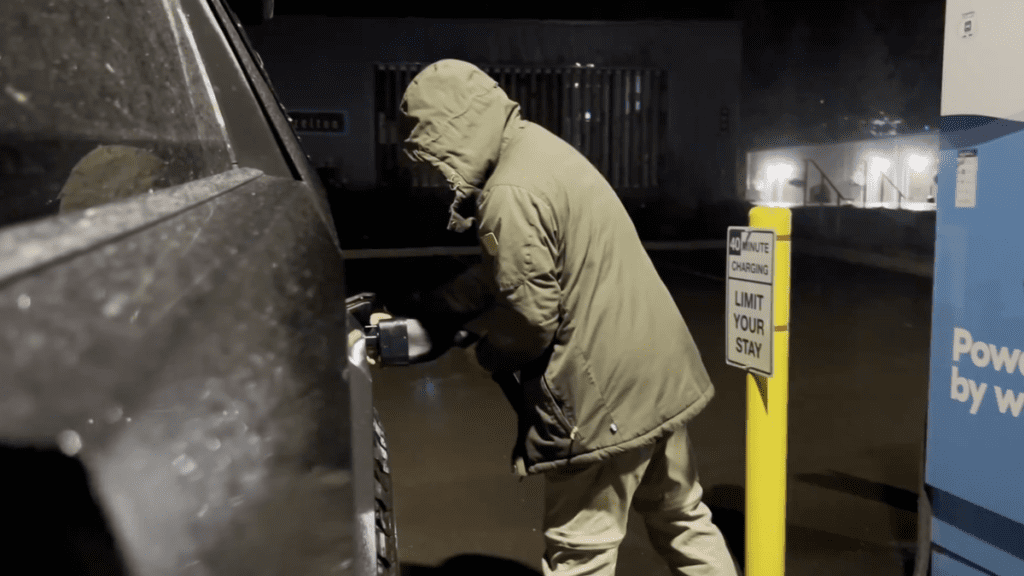Three Tesla Cybertruck Owners Are Driving From Florida To The Arctic Circle And Already Having Problems

As a big Arctic and Antarctic exploration nerd, I can tell you with confidence that that shit is hard. A few guys on Twitter are making the trip to the Arctic circle purposefully more difficult by trying to complete the trip in Tesla Cybertrucks and, honestly, they kinda rock for the attempt.
Electric Car Charging Still Sucks, But That Might Change
The road trip started in southern Florida and is taking the Cybertruck straight across the entire U.S. and into Canada. The intrepid EV warriors are already running into problems on their way to the start of their nearly 500-mile trek from the Arctic Circle to the shores of the Arctic Ocean. No, it’s not their Cybertrucks shutting down after going through a car wash, it’s the lack of much charging infrastructure in the Yukon. From Futurism:
One of the team members, who goes by Bearded Tesla on X-formerly-Twitter, has been documenting just how tricky it’s been to keep the Cybertruck’s batteries topped up, especially when it comes to non-Tesla Supercharger stations.
Tesla’s official map of its charging network shows that its Superchargers are noticeably absent in Canada’s northern provinces.
“We are in the Yukon, which is pretty cool because all the chargers are free,” he said in a recent video. “It’s free because it’s one charge post. I waited an hour to be able to plug in here and I will have to change for like two and a half hours to make it to the next charger.”
Before even getting to the Yukon, Bearded Tesla was battling with a charger that was shutting off every five minutes.
Another team member, who goes by Teslatino, reached out to the British Columbia Hydro and Power Authority to ask when the province would be getting Tesla-compatible connectors (NACS) for new charging stations.
In a separate video, he revealed that it took five tries and two different stalls at a BC Hydro charging station to get an adapter for the station’s CCS connectors to work.
Oh boy, Bearded Tesla. Charging generally sucks down here where there are people who actually need to use it. That far up north? EVs and fellow humans are even fewer and farther between. This would be a great opportunity, however, to highlight how rural communities are often left out of big infrastructure projects, like broadband internet and the most up-to-date cellphone service as well as EV charging infrastructure.
I spoke to Explorer’s Club Transglobal Car Expedition back in January about the daunting task of driving around the globe through both poles — a trip of 31,000 miles through almost every habitat on the planet. They were quite proud of a hybrid Ford F-150 they were bringing with them…as far as Yellowknife in Canada’s Northwestern Territories. Beyond that last bastion of civilization, the Explorer’s team told me, everything runs on diesel.
There’s a good reason for that — driving through such wilderness is not for the faint of heart, nor is it a time for civilians to take untested technologies out for a spin. You can get in bad trouble driving around the Arctic in a less than reliable vehicle, as our own Raph Orlove learned on his own Arctic expedition:
In driving to Alaska the first time, I got used to a few things about driving up north. Don’t drive at dusk or at night, because that’s when large animals are out and that’s when you hit them. (Someone we knew totaled their car hitting a moose while making the same trip up the Alcan the same time as we were driving the Cassiar.) Be aware of bears. (Someone was also killed by a bear in British Columbia while we were driving through, as well.) Always stop for gas if gas is available no matter how full your tank is already.
But I wasn’t exactly sure how the Klondike Highway is, or what it’s like going all the way up to the ocean. I googled around and found that, oh, there are polar bear sighting tours up in Inuvik. Polar bears kill people.
“Yeah,” my buddy told me over the phone when I brought this up. “There’s a non-zero chance of polar bears.
“You’re in the area where brown bears and polar bears mix,” he continued, “and produce viable offspring.”
Ah yes. “Viable offspring.” Always good to hear.
“They probably won’t bother you, just the smellies,” he encouraged me, referring to any food or food-like material I might have. I remember being warned about toothpaste on my old hiking trips into the Sierras.
“I would sleep in the car would be my thought,” he explained. “No smellies in the car. Probably the beef jerky should stay in the bear canister.” How far away should the bear canister be? “100-200 yards.” Cool.
The cold will also likely have an affect on the truck’s range. The Cybertruck has not exactly proven itself terribly reliable or bear proof. Having your form of transportation break down out can end with some grisly consequences. But if multiple VW Beetles can take on the Antarctic, then why not a Cybertruck? It certainly looks like Bearded Tesla is going into this with his eyes wide open in a modified Cybertruck:
It’s not everyday you see a Cybertruck with jerry cans on the side.
This strikes me as unwise, but driving to the Arctic Circle is something I’ve also wanted to do my whole life (likely in a large rented diesel truck of some kind). I can’t help but admire their gumption and wish these Cybertruckers nothing but good weather and a lack of bears. You can follow their trek at @teslatino, @beardedtesla, and @blueskykites.



